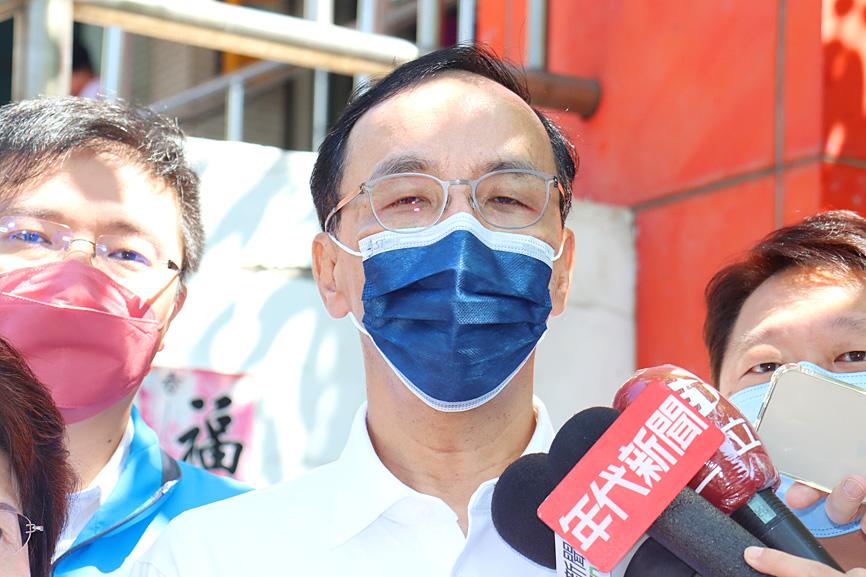Chinese Nationalist Party (KMT) Chairman Eric Chu (朱立倫) yesterday welcomed US House Speaker Nancy Pelosi’s visit to Taiwan and dismissed rumors of fractured opinions within the party regarding the visit.
The KMT has always adopted a pro-US stance, Chu said.
The KMT’s official stance is that Pelosi’s visit is a welcome move, despite dissenting comments by individual party members, Chu said.

Photo: Wong Yu-huang, Taipei Times
Chu referred to remarks by Legislator Wu Sz-huai (吳斯懷), who said “provoking the CCP [Chinese Communist Party] is unnecessary,” and Legislator Yeh Yu-lan (葉毓蘭), who said that Pelosi’s visit harms Taiwanese businesses, as China reacted by imposing import bans.
The KMT is dedicated to the defense of Taiwanese, upholding regional peace and looking out for Taiwan’s interests, Chu said, adding that the party is willing to work with all international friends who are sincere about their intent to boost the Republic of China’s interests.
Chu chided Beijing for resorting to military exercises to express its discontent over the visit, saying that his position has always been that the two sides of the Taiwan Strait must engage in dialogue and try to understand instead of antagonizing each other.
The US Congress represents the will of Americans, and while Washington’s policies toward China have not changed, Taiwan should welcome the support of the US public, he added.
Separately, KMT legislative caucus whip William Tseng (曾銘宗) said the KMT would stand with other democratic countries to jointly uphold peace and stability in the Indo-Pacific region.
Tseng made the remarks at the KMT caucus’ news conference after a closed-door meeting with Pelosi, Deputy Legislative Speaker Tsai Chi-chang (蔡其昌) and three legislative caucus conveners of other parties.
“We hope the visit will bring about stability and peace in the Taiwan Strait,” Tseng said.
Tseng said that the talks dealt with enhancing supply chains, including the roles of Taiwan Semiconductor Manufacturing Co and other chipmakers.

A strong continental cold air mass is to bring pollutants to Taiwan from tomorrow, the Ministry of Environment said today, as it issued an “orange” air quality alert for most of the country. All of Taiwan except for Hualien and Taitung counties is to be under an “orange” air quality alert tomorrow, indicating air quality that is unhealthy for sensitive groups. In China, areas from Shandong to Shanghai have been enveloped in haze since Saturday, the ministry said in a news release. Yesterday, hourly concentrations of PM2.5 in these areas ranged from 65 to 160 micrograms per cubic meter (mg/m³), and pollutants were

Taiwan’s armed forces have established response protocols for a wide range of sudden contingencies, including the “Wan Chun Plan” to protect the head of state, the Ministry of Defense (MND) said today. After US President Donald Trump on Saturday launched a series of airstrikes in Venezuela and kidnapped Venezuelan President Nicolas Maduro, concerns have been raised as to whether China would launch a similar “decapitation strike” on Taiwan. The armed forces regularly coordinate with relevant agencies and practice drills to ensure preparedness for a wide range of scenarios, Vice Minister of National Defense Hsu Szu-chien (徐斯儉) told reporters before a

EVA Airways on Saturday said that it had suspended a pilot and opened an investigation after he allegedly lost his temper and punched the first officer several times as their plane was taxiing before takeoff at Los Angeles International Airport. According to a report published on Thursday by The Reporter, the incident occurred after the flight’s Malaysian first officer tried to warn the Taiwanese pilot, surnamed Wen (文), that he was taxiing faster than the speed limit of 30 knots (55.6kph). After alerting the pilot several times without response, the first officer manually applied the brakes in accordance with standard operating

Japanese Councilor Hei Seki (石平) on Wednesday said that he plans to visit Taiwan, saying that would “prove that Taiwan is an independent country and does not belong to China.” Seki, a member of the Japan Innovation Party, was born in Chengdu in China’s Sichuan Province and became a naturalized Japanese in 2007. He was elected to the House of Concilors last year. His views on the Chinese Communist Party (CCP) — espoused in a series of books on politics and history — prompted Beijing to sanction him, including barring Seki from traveling to China. Seki wrote on X that he intends